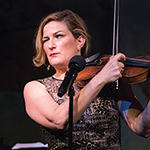Carole J. Bufford
After Hours Stomp: A Boogie-Woogie, Blues, & Hot Jazz Jubilee
Birdland, NYC, August 25, 2019
Reviewed by Alix Cohen for Cabaret Scenes

Photo: David Rosen
Nobody vamps like Carole J. Bufford. She moves like a classy burlesque performer deploying wide eyes and heavy-lidded come-on with the aim of a guided missile. Tenacious vocal control and I-mean-business innuendo bring this material to vibrant life. Aided and abetted by MD/pianist Arthur Migliazza, whose feeling for and skill with music of the era might convince one to believe in reincarnation, along with top-tier musicians Tom Hubbard (bass) and Ray Marchica (drums), Bufford’s show delivers in spades.
A captivating version of Cole Porter’s “Too Darn Hot” begins a cappella riding finger snaps and then Fosse-style rhythmic bass. Start/stop drum punctuation adds to the sizzle. Needless to say, Bufford can dance. Though this artist may take things a step further, her sexy withholding brings to mind Gypsy Rose Lee.
“This song was released right after prohibition ended” introduces Wesley Wilson’s 1933 “Gimme a Pigfoot (and a Bottle of Beer).” Bufford projects insouciance. “Do You Know What It Means to Miss New Orleans?” (Eddie Delange/Louis Alter) emerges languid, but gutsy. The piano strolls, the brushes circle, the bass is stroked. The vocalist knows when to spit and when to cream lyrics, staying savory rather than sweet even in seduction.
Two duets with Migliazza include an eeeeazeee “Walkin’ My Baby Back Home” (Roy Turk/Fred E. Ahlert, 1930) to a hurdy-gurdy-like boogie, and the playful “Sweet Hunk of Trash” (James P. Johnson/Flournoy E. Miller), during which the collaborators exude bonhomie.
Migliazza follows his personable, self-effacing anecdote about Chuck Berry with a display of adrenaline-churning, right-leg-pumping skill on Berry’s “You Never Can Tell” and dominates a seemingly four-handed “Bumble Boogie” (Jack Fina). His keyboard also shuffles, swaggers, rolls, flips, and even caresses, exhibiting his awareness and range.
“It’s always been my dream to see My Fair Lady’s Eliza Doolittle be a bit of a vamp,” Bufford explains prefacing her own Latin-influenced arrangement of “I Could Have Danced All Night” (Frederick Loewe/Alan Jay Lerner) and “Whatever Lola Wants” (Richard Adler/Jerry Ross from Damn Yankees). Masterful percussion rules this number. Something of a purist, I find myself unexpectedly charmed.
A simply beautiful rendition of Richard Rodgers/Lorenz Hart’s “It Never Entered My Mind” may not be appropriate to the menu, but it deserves a call-out for its affecting melancholy. Bufford stands at the center of feeling even during a tender instrumental.
“You’ve Got the Right Key (but the Wrong Keyhole)” (Eddie Green/Clarence Williams, 1924) brings out Bufford’s scrappy growl. Prancing to the oom-pah rhythm and shimmy/slide piano, her teasing singes. Bowed bass and percussion comment. We close with a foot-tapping, head-bobbing “It’s A Good Day” (Peggy Lee/Dave Barbour). Super.





